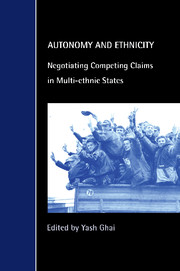Book contents
- Frontmatter
- Contents
- Acknowledgements
- List of Contributors
- 1 Ethnicity and Autonomy: A Framework for Analysis
- Part I Operating Autonomies
- Part II Failed Autonomies
- Part III Seeking Autonomies
- 8 Ethnicity and the New Constitutional Orders of Ethiopia and Eritrea
- 9 The Politics of Federalism and Diversity in Sri Lanka
- 10 Cyprus: From Corporate Autonomy to the Search for Territorial Federalism
- 11 Bougainville and the Dialectics of Ethnicity, Autonomy and Separation
- 12 The Implications of Federalism for Indigenous Australians
- List of Cases
- List of Legislation
- Index
12 - The Implications of Federalism for Indigenous Australians
Published online by Cambridge University Press: 06 July 2010
- Frontmatter
- Contents
- Acknowledgements
- List of Contributors
- 1 Ethnicity and Autonomy: A Framework for Analysis
- Part I Operating Autonomies
- Part II Failed Autonomies
- Part III Seeking Autonomies
- 8 Ethnicity and the New Constitutional Orders of Ethiopia and Eritrea
- 9 The Politics of Federalism and Diversity in Sri Lanka
- 10 Cyprus: From Corporate Autonomy to the Search for Territorial Federalism
- 11 Bougainville and the Dialectics of Ethnicity, Autonomy and Separation
- 12 The Implications of Federalism for Indigenous Australians
- List of Cases
- List of Legislation
- Index
Summary
Australian federalism is a by-product of the manner in which the Australian state was created in 1901, through the voluntary amalgamation of six self-governing British colonies, each with its own constitution, institutions and laws. For its critics, the federal system is kept in place largely by habit and entrenched interests. More objectively, however, a federal form of government still plays an important role in Australia. Decentralised government of some kind is dictated by geographic size. By offering a more local level of government, federalism thus contributes, at least potentially, to Australian democracy. In the absence of other significant constitutional constraints, including protection of rights, federalism provides a check on public power. Indeed, given Australia's adherence to the British constitutional tradition, had a normative constitution not been necessitated by the introduction of a federal system, it is doubtful that Australia would have had one at all.
Australian federalism plays no role in moderating competing ethnic demands. For the first fifty years after federation, the Australian population overwhelmingly, although not exclusively, was Anglo–Celtic in composition. Successive waves of migration following World War II, initially from Europe and more recently from Asia, have created a multi-ethnic people, but in a way that has no particular implications for the federal system. There is no concentration of discrete groups in different parts of Australia. Multicultural policies are disputed, but no one seeks to resolve the dispute through the application of federal principles, in the sense of providing forms of self-government for particular ethnic groups.
- Type
- Chapter
- Information
- Autonomy and EthnicityNegotiating Competing Claims in Multi-Ethnic States, pp. 266 - 286Publisher: Cambridge University PressPrint publication year: 2000
- 4
- Cited by



